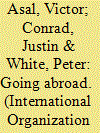| Srl | Item |
| 1 |
ID:
134982


|
|
|
|
|
| Summary/Abstract |
Existing literature on contentious political movements has generally focused on domestic political activity. Using the new Minorities at Risk Organizational Behavior–Middle East data set (MAROB-ME), which contains organization-level data for 104 ethnopolitical organizations in the Middle East and North Africa, we analyze the decision of both violent and nonviolent organizations to engage in political activity transnationally. Among the results, we find that diaspora support is associated with transnational nonviolent protest, whereas foreign state support and domestic repression increase the use of transnational violence. The most robust finding, however, is that participation in the domestic electoral process consistently reduces the likelihood that an organization will engage in any political activity abroad.
|
|
|
|
|
|
|
|
|
|
|
|
|
|
|
|
| 2 |
ID:
134796


|
|
|
|
|
| Summary/Abstract |
This article examines Tea Party candidates for the US House of Representative in 2012. Tea Party and Tea Party–endorsed candidates are similar to other Republican candidates. Although they have served in the House for a shorter period, they have approximately the same financial resources, prior political experience, and reelection rate as other Republicans. Multivariate analysis finds that Tea Party membership and endorsement have no impact on electoral outcome when other political factors are controlled for (e.g., incumbency, running for an open seat, quality of opposing candidate, prior political experience, financial resources, and Obama’s vote). Consequently, the success of Tea Party candidates depends on acquiring the traditional political resources, having weak opponents, and running in favorably disposed constituencies rather than identification with this highly visible political movement.
|
|
|
|
|
|
|
|
|
|
|
|
|
|
|
|